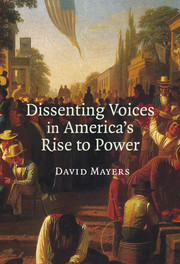Introduction
Published online by Cambridge University Press: 05 June 2012
Summary
This book examines US foreign policy from Thomas Jefferson's purchase of Louisiana expanse to the Korean War. That period of one hundred and fifty years corresponded with the rise of US might from fledgling republic to transcontinental giant with overseas reach: empire. By mid-twentieth century, the US gross national product, exports as a percentage of world exports, and nuclear delivery systems dwarfed those of all competitors or other powers, including Great Britain, China, France, Germany, Japan, and the USSR.
This study serves as a companion to my earlier Wars and Peace: The Future Americans Envisioned, 1861–1991. I reviewed in it how a broad range of Americans during security crises conceptualized future world orders. I did so with a conviction that political imagination is not an exclusive property of the policymaking elite: Americans of diverse political stripes have always flavored public discourse with their versions of truth and solutions to problems. Thus I scrutinized the views of nonconformists, civil rights activists, feminists, and scholars. I drew connections between this eclectic crowd and the ideas – plus decisions – of policymakers in Washington. In effect, I sought to reacquaint readers with prominent, often controversial, thinkers whose eloquence, passion, and even wrongheadedness gave texture to the debates of their times.
My analytical concern here is more restricted than in Wars and Peace. The focus is on dissenters within the responsible class, coextensive with members of Congress, high-ranking soldiers, ambassadors, and cabinet officers.
- Type
- Chapter
- Information
- Dissenting Voices in America's Rise to Power , pp. 1 - 10Publisher: Cambridge University PressPrint publication year: 2007

